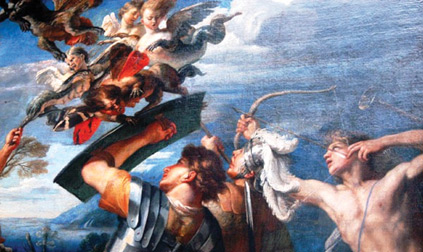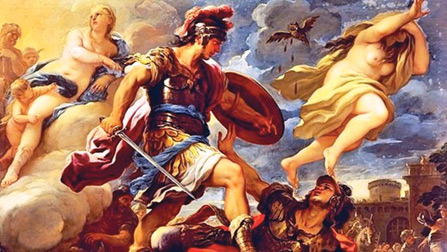|
Virgil's Aeneid :
Predestined fate could not be changed
by W.T.J.S. Kaviratne Ambalangoda spl. Cor.
Publius Vergilius Maro better known as Virgil was a friend of
Augustus Caesar (Octavius) who became the first Emperor of the Roman
Empire. Augustus during the golden era of Rome became an active patron
of Virgil and numerous other writers. He constantly encouraged Virgil to
reach the zenith of poetic excellence.
 On the suggestion of Augustus, Vigil as a court poet motivated by
great dedication, pride and enthusiasm composed an epic poem on the
Roman Empire and Augustus Caesar, known as 'Aeneid.' On the suggestion of Augustus, Vigil as a court poet motivated by
great dedication, pride and enthusiasm composed an epic poem on the
Roman Empire and Augustus Caesar, known as 'Aeneid.'
Virgil took 11 years to compose the rough draft of the poem and
before the completion of the final draft he planned a trip to Greece and
Asia and on his return he died on September 21, 19 B.C.
Even though Virgil had asked in his last will to destroy the
uncompleted epic, Augustus employed two other poets to edit the original
manuscript and to publish it.
Glorification of Rome
Aeneid is a national epic of Rome and should not be considered only
as a personal epic composed on its protagonist ' Aeneas .'
In Virgil's Aeneid through symbolism, and poetic devices of the genre
of literary epic glorified and exalted Rome and its destiny.
Having the qualities of a philosopher and a thinker Virgil possessed
a divine and idealistic conception of Rome.
For him Rome was majestic, sacred and ordained by destiny and
providence to rule the world.
'Aeneas the hero of the poem Aeneid was the personification of the
Roman virtues and the Emperor Augustus was considered the descendant of
Aeneas.'
Throughout the adventurous expedition Aeneas had been fated to
undergo numerous troubles, tribulations and challenges a mortal had
never encountered.
But he consoled himself realising the fact that he was fated to found
the great destiny of the Roman nation.
Virgil was a staunch believer that all human affairs were controlled
by superhuman forces and he composed Aeneid to sing the greatness of
Rome ordained by the Gods.
The narration of the Aeneid unfolded the incidents of the episode
revealing that no force could prevent Aeneas from building a city which
one day would become the Great Roman Empire.Jupiter the father and the
ruler of gods provided the divine support for the success of Aeneas and
his band of Trojans in the achievement of their destined goal of
founding Rome amid the rivalries of the Goddess Juno the Queen of
Heaven.
 Virgil opens his poem by invoking an appeal to the Muse of Poetry for
divine inspiration in tune with the epic style of Homeric poems of Iliad
and Odyssey. Virgil opens his poem by invoking an appeal to the Muse of Poetry for
divine inspiration in tune with the epic style of Homeric poems of Iliad
and Odyssey.
Search of a new home
Aeneas and the surviving Trojans fled their home city of Troy
destroyed by the Greeks and they set sail in search of Italy where
Aeneas was destined to found Rome. Goddess Juno promised Aeolus the God
of Winds an offer of the loveliest Sea Nymph known as ' Deiopea as a
wife if he could create a fierce storm to destroy Aeneas's fleet.The
Trojans were forced to land on Carthage where Dido the founder and the
Queen of Carthage welcomed Aeneas and the surviving Trojans.
Venus the Goddess of Love happened to be the mother of Aeneas who
introduced him to Dido the beautiful Queen of Carthage.
Dido became a widow as her wealthy husband ' Sychaeus ' was killed by
her own Brother ' Pygmalion ' for his gold.
Dido and her husband Sychaeus lived in the City of Tyre in Phoenicia
(Lebanon). One day Sychaeus appeared as a ghost and advised Dido to
leave the City of Tyre. Dido fled Tyre and settled in Libya and found
that Carthage comprised the refugees from Tyre. Goddess Venus advised
his son Aeneas to go into the City of Carthage and talk to Dido.
Aeneas and his friend Achates reached Carthage on the divine
instructions.
On their way to the City of Carthage in the outskirts of the city
they found a shrine consecrated to Juno and were surprised to see a
mural depicting the events of Trojan War.
Reaching Dido's palace they found many of the Trojans who were lost
and disappeared during the storm. They were seen asking Queen Dido to
help them in rebuilding the damaged fleet of ships.
Dido while granting their request said she would like to meet their
leader Aeneas. Dido invited the Aeneas to dine with her in her palace.
Fearing that Goddess Juno could incite Phoenicians against her son,
Goddess Venus sent Cupid another son of hers to inflame Queen Dido's
heart with full of passion for Aeneas.
On the request of Dido, Aeneas narrated the long and perilous journey
full of adventures on land and sea for seven long years since the day
they left the burning City of Troy.
He recounted the history of the Trojan War and the sack of the City
of Troy which lasted for 10 years. Aeneas told how he escaped the
burning city carrying his father ' Anchises ' on his back and leading
his son ' Ascanius ' by his hand.
Aeneas revealed that his wife ' Creusa ' died in the struggle to
escape.
Aeneas and Dido lived together in deep love till the gods reminded
him of their decree to find a new home in Italy. Again Aeneas and his
followers got ready to set sail in search of Italy.
Dido who was devastated by his sudden departure committed suicide by
ordering a huge pyre to be built out of the cast away items belonged to
Aeneas. Dido climbed on it and stabbed herself with the sword left by
Aeneas. On their voyage to Italy due to increment weather conditions
they were brought to Sicily where the Trojans held ' Funeral Games ' in
memory of the dead Anchises, the father of Aeneas.
Instigated by Goddess Juno, the Trojan women who were tired of the
voyage lasted for 10 years started to burn the ships but a downpour put
out the fire.
One night, Anchises the father of Aeneas visited him in a dream and
Aeneas had descended to the ' Underworld ' with the guidance of Sibyl of
Cumae to visit his father. When in the Underworld, Aeneas was shown a
pageant of future history and heroes of Rome.
Aeneas returned from the Underworld with great enthusiasm and
determined to continue his voyage towards the region of Latium. The King
Latinus who ruled Italy proved to be very friendly towards the visiting
Trojans led by Aeneas.
A prophecy once revealed King Latinus that a foreigner who could
visit his kingdom would marry his Daughter Lavinia. Amata, the consort
of Latinus had already made arrangements for her daughter to marry a
local suitor known as Turnus.
Amata and Turnus conspired against the newly arrived Trojans in
Italy.
A sudden fight broke out between the Trojans and the Italians for
killing a pet stag that belonged to a herdsman by a Trojan named
Ascarius. King Latinus who opposed war from the inception was unable to
restrain the agitators and refused to declare war and resigned from
controlling the affairs of the government.
Jupiter called a council of the Gods at his palace on Mount Olympus
and ordered them not to support either the Trojans or the Italians.
He said mortals should settle the issue alone without divine support
and the destiny would select the victor.
The River God Tiberius instructed Aeneas to set sail towards the
north up the River Tiber to obtain military support. His mother Goddess
Venus descended during his voyage and handed over a new set of weapons
wrought by Vulcan.
Turnus on the instructions of the Goddess Juno took the advantage of
the absence of Aeneas made plans to attack the Trojan camp by the mouth
of the river Tiber.
Turnus decided to burn the Trojan ships found along the bank of
Tiber.
On returning to Italy Aeneas saw how the Trojans and the Italians
killing each other. Turnus who had joined the fight killed Pallas the
son of Evander.
With the killing of Pallas the fight took a new turn and Aeneas flew
into violent fury and on that day many people from both sides had been
killed. To bury the dead both sides agreed to a truce. |

